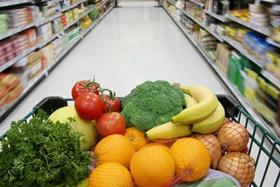
Take-home grocery sales rose by 9.3 per cent in the 12 weeks to 1 November, with no extra spike in demand despite various lockdown restrictions coming into force across the country.
This is according to the latest grocery market share data fromKantar, which showed that in the four weeks to 1 Novembersales increased by a similar 9.4 per cent.
Growth rates peaked in Wales, where restrictions were tightest, up by 15 per cent in the month to 1 November.
Fraser McKevitt, head of retail and consumer insight at Kantar, said:“Welsh shoppers increased their spending by an average of £10 during the week when the ‘firebreak’ lockdown came into effect.
“The following week, online shopping in Wales hit its highest ever level accounting for 16.2 per cent of the market.In Britain as a whole, a record 5.9 million people purchased groceries online in the month of October.”
Early evidence suggests that consumers in England were confident about getting the essentials during the new lockdown – which started on 5 November – even if the restrictions impinge on festive shopping.
McKevitt said:“While there was some uplift in Wales, the increased spending did not provide any evidence of stockpiling, and initial figures suggest no sign of panic buying in England either.But one thing is always front of mind at this time of year – Christmas – and it seems many people sought to get ahead with gift buying before stores closed.”
Meanwhile, premium own-label products are up by £56 million this month.The category consistently hits its peak in December, so this could be an early indication of more to come as we approach what is likely to be an unusual Christmas.
Halloween was different this year as well, with shoppers celebrating at home, rather than on the streets. The same amount was spent on pumpkins as in 2019 – £9 million – but sales of sugar sweets were 2.3 per cent lower in October as trick or treating was put on hold.
Meanwhile, sales of frozen food rose by 12 per cent in the 12 weeks to 1 November, with McKevitt noting they have been a “hot ticket” since the start of the pandemic.
This shows the desire for long-lasting provisions in the current climate, he says. And Iceland has benefited the most from the trend, helping to grow its market share to 2.3 per cent, from 2.1 per cent last year.
“Overall, the retailer’s sales were up by 17.9 per cent, and shoppers didn’t stop at the freezer section,” sais McKevitt. “More was spent in Iceland’s chilled and ambient aisles as well, meaning the average spend per trip was worth 44 per cent more than in 2019, the greatest increase of any retailer.”
Ocado was again the fastest-growing retailer, with sales up by 36.1 per cent, increasing its market share to 1.7 per cent.
Waitrose, meanwhile, grew ahead of the market, by 10.6 per cent, and its share rose for the first time since 2017 to 5.1 per cent. The premium retailer increased its online sales faster than any other grocer this period.
Morrisons led the big four, growing sales by 11.4 per cent, and expanding its share for the fifth month in a row. It now accounts for 10.2 per cent of sales, helped by its‘The Best’premium own-label brand, which grew by 42 per cent.
Sainsbury’s sales rose by 7.6 per cent this period and its market share currently sits at 15.3 per cent.The retailer recently announced it would permanently close its fresh food counters, a move which reflects a market-wide drop off in the number of people using in-store butchers, delis, and fishmongers.
Asda increased sales by five per cent in the period and it holds a market share of 14.4 per cent.
Tesco, which grew by 9.1 per cent, maintained its share at 27 and had success through both physical and online sales.
Lidl’s growth accelerated to 12.5 per cent, with market share up to 6.1 per cent, while Aldi’s sales rose by 6.6 per cent, and its share fell slightly to 7.8 per cent.
Co-op increased sales by 8.6 per cent, but its market share dipped to 6.4 per cent, while independent retailers accounted for 1.9 per cent of the market, as sales grew by 15.6 per cent.



